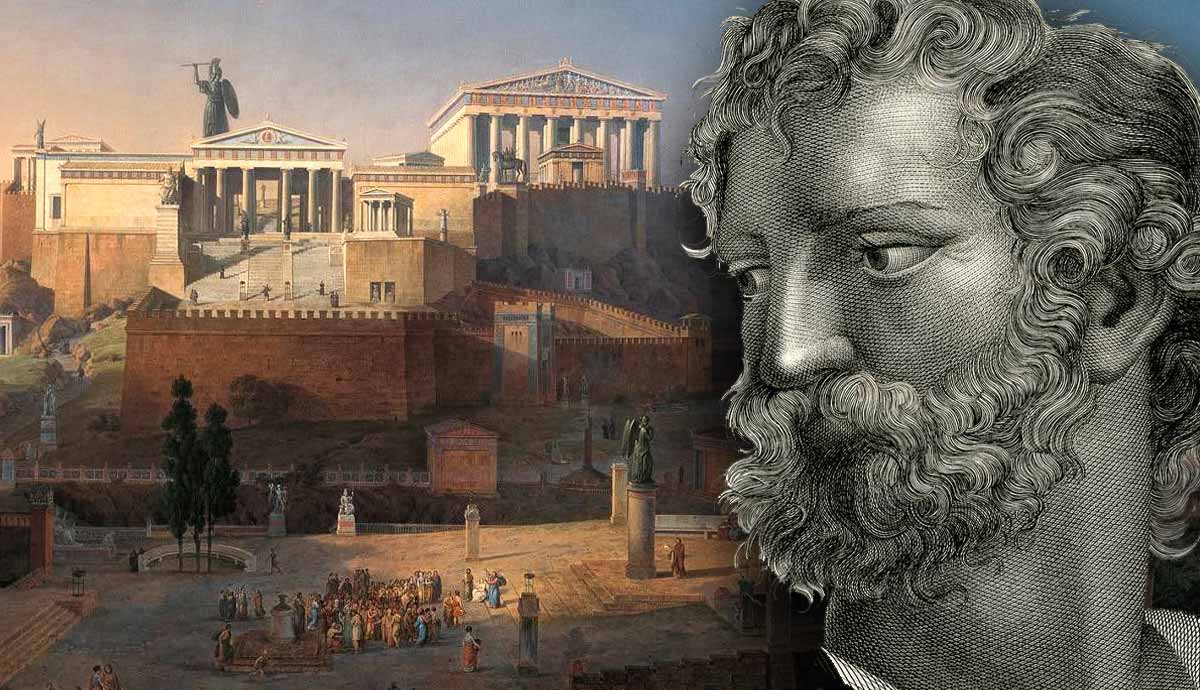
Islamic philosophy remains woefully understudied, despite the many important similarities, affinities, and points of discursive contact with so-called Western philosophy. This article attempts to offer an introduction to Islamic philosophy through summaries of the work of the three most important Islamic philosophers: al-Kindi, al-Farabi, and Ibn Sina.
1. Al-Kindi

Abu Yusuf Ya‘qub ibn Ishaq al-Kindi is the earliest major philosopher in the Islamic tradition. He was a central figure in what we now call the “Kindi circle,” the name given to a group of translators (mostly Syriac Christians) who were responsible for rendering many of the major works of Greek philosophy into Arabic, especially the works of Aristotle.
Al-Kindi lived from roughly 800-870AD, and was at one point a major figure at the court of the caliph al-Mu’tasim, even being given the responsibility of tutoring the caliph’s son. His major philosophical work was called On First Philosophy, of which we have only the first part. This part has four sections: first, there is an exhortation to honor Greek philosophical wisdom. Then there is a discussion of the eternity of the world (perhaps al-Kindi’s most celebrated argument). Then some arguments are given for the existence of God, and the ineffability of God is discussed.

Al-Kindi’s study of metaphysics was closely related to his conception of God, and his attempts to explain elements of revelation in more rational, philosophical terms.
Al-Kindi associates being and truth to such an extent that they are arguably conflated, holding that “everything that has being has truth”, and moving between these two apparently separate categories fluidly. For God to be the cause of all Truth is to say that God is the cause of all being.
The central concept in On First Philosophy is that of oneness. Al-Kindi argues that the first cause of being must also be the first cause of oneness, partly on the basis that bringing something to be is really a matter of imposing unit where there was none previously.
The third section of On First Philosophy largely consists of the attempt to prove that nothing can be its own cause, or the cause of its own unity. Al-Kindi attempts to show this by surveying various types of “utterance” and classifying various predicates (that is, descriptions that might be given of a certain thing).
Predication, Unity, and Disunity in al-Kindi

Al-Kindi claims that every predicate has contained within it both elements of unity and disunity. In one oft-quoted example, the concept of “animal” has only one genus, but contains within it many species.
Al-Kindi has an explanation for this unity and multiplicity in all things, which is to say that there must be some first cause that is free of multiplicity. This first cause must be such that nothing can be predicated of it—it cannot be described in any way that can be denied. This simplicity of the first cause constitutes a pure unity, from which any further complexity constitutes the creation of multiplicity and unity (given that all things proceed from it, and are, therefore, unified).
This True One is the cause of being as well as unity. This means that al-Kindi conceives of God as a kind of efficient cause (to take an Aristotelian term). To be an efficient cause is to be the principle of change in an object. With respect to the instantiation of an object, its efficient cause is that which gives it a reason to be. Aristotle says, for instance, that the efficient cause of a child is their parents.
Al-Kindi was not only the first philosopher of the Islamic tradition, but one whose intellectual inheritance—especially his debt to Aristotle—would go on to prove highly influential for subsequent philosophers.
2. Al-Farabi

Abû Nasr al-Farabi’s birthplace is not known, and he has variously been described as being of Turkic or Persian origin. Certainly, the traditional conception of him is as a Turk, given the long-standing cliché that Islamic philosophy had three great thinkers—one an Arab (al-Kindi), one a Turk (al-Farabi), and one a Persian (Ibn Sina).
In any case, what we do know is that al-Farabi spent a great deal of time in Baghdad and was well acquainted with the Syrian Christian scholars, as al-Kindi had been.
The introduction of the logical tools developed by Aristotle was a major source of debate among Islamic intellectuals of the 9th and 10th centuries, after these works became available in Arabic. Al-Farabi uses logic as a tool for analyzing the production of argument forms in other areas of intellectual investigation (e.g., jurisprudence and theology).
In his book entitled “The Short Treatise on Reasoning in the Way of the Ancients,” al-Farabi offers a systematic account of the consequences of logical analysis for arguments made by jurists. That is, he applied the syllogism—the distinctive mark of Aristotelian logical analysis—and extended it beyond the realm of logic itself.
Syllogisms are patterns of reasoning that consist of at least two premises and a conclusion.
Al-Farabi’s Synthesis of Aristotle

Al-Farabi attempts to synthesize and reconcile seemingly disparate elements of Aristotle’s work. Crucial to all of this is the way in which al-Farabi tries to relate logic, grammar, and language to one another. He holds that logic is similar to grammar, in that the relationship which exists between logic and “intelligibles” is the same as or equivalent to that which holds between language and the expressions of a language.
An “intelligible” here is a distinctly Aristotelian term, referring to universal concepts and principles of all particulars. This trades on the Aristotelian division of the intellect into two parts: the passive intellect, which receives the form of things, and which can also be seen as the location of the preconditions of knowledge, and the active intellect, which takes the fruits of the passive intellect and fills in the particulars required to create actual knowledge.
Every rule for expressions that we get from grammar has an analogous rule for the intelligibles, which is what the science of logic provides us with. The definition of the subject matter of logic is, therefore, clear: it is the development of rules for the intelligibles, which are in turn signified by expressions in everyday language.
3. Ibn Sina: Beyond Plato and Aristotle

Ibn Sina was a philosopher born in modern-day Uzbekistan, which is far from the Levant and Arabia, which were the more traditional heartlands for Islamic philosophy up until that point. Evidently, this was no great handicap. Indeed, arguably it was Ibn Sina’s unwillingness to accept the norms established for philosophical inquiry elsewhere that makes his work stand out for its originality and enduring philosophical value.
In defining metaphysics or first philosophy, al-Kindi described it as the “first truth which is the cause of all truth,” following an approach established most definitively by the Neoplatonists. Al-Farabi, for his part, focused on the 3-part division of metaphysics into the study of beings in general, principles of demonstration, and of noncorporeal beings. Ibn Sina is the first philosopher to move from studying beings to studying being, to extending beyond Platonic and Aristotelian foundations to focus on Being itself as the subject of metaphysics.

Following Soheil Afnan, we observe that whereas for Plato the foundation of metaphysics was the Theory of ideas, and for Aristotle, it was the doctrine of potentiality, Ibn Sina makes the study of being as being the center of metaphysical inquiry.
Yet Ibn Sina is bound, as more modern philosophers for whom the central questions of philosophy as questions of being, to start with an investigation of actual beings. It is perhaps for this reason that Ibn Sina sees philosophy as full of problems, as the resolution of problems, as the clarifying of error: the subject matter which he is most interested in (being as such) is not immediately available to be studied.
Perhaps Ibn Sina’s greatest gift to those after him was the conception of philosophy as operating on problems for which no good answer could easily be found, and for which it was an achievement even to ask the right question.










